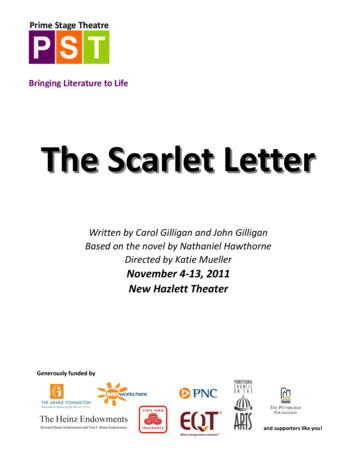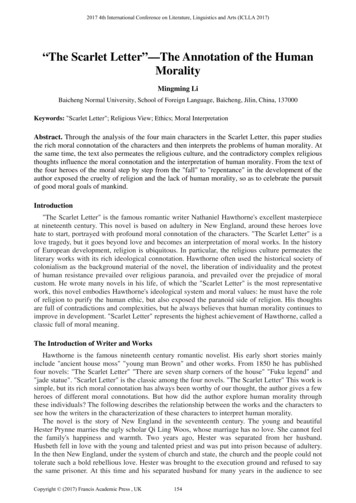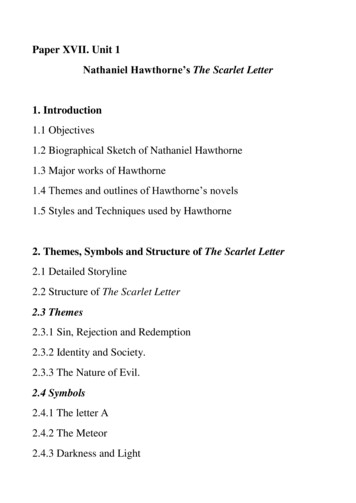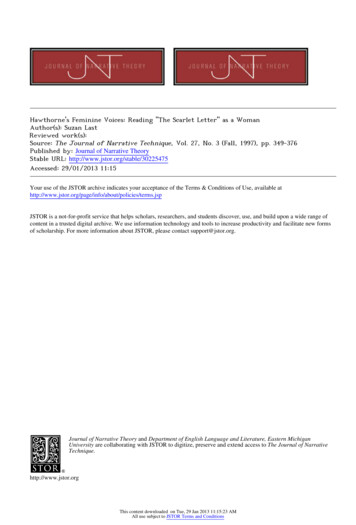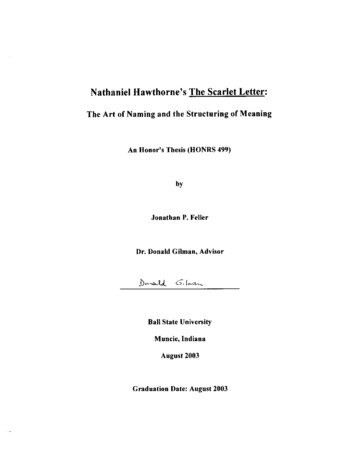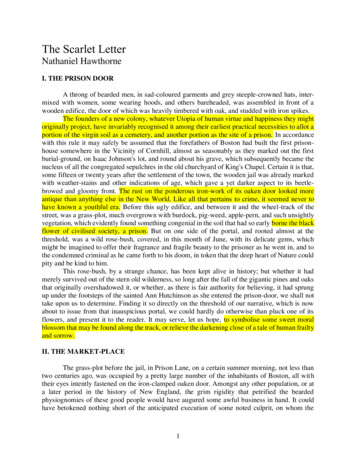
Transcription
The Scarlet LetterNathaniel HawthorneI. THE PRISON DOORA throng of bearded men, in sad-coloured garments and grey steeple-crowned hats, intermixed with women, some wearing hoods, and others bareheaded, was assembled in front of awooden edifice, the door of which was heavily timbered with oak, and studded with iron spikes.The founders of a new colony, whatever Utopia of human virtue and happiness they mightoriginally project, have invariably recognised it among their earliest practical necessities to allot aportion of the virgin soil as a cemetery, and another portion as the site of a prison. In accordancewith this rule it may safely be assumed that the forefathers of Boston had built the first prisonhouse somewhere in the Vicinity of Cornhill, almost as seasonably as they marked out the firstburial-ground, on Isaac Johnson's lot, and round about his grave, which subsequently became thenucleus of all the congregated sepulchres in the old churchyard of King's Chapel. Certain it is that,some fifteen or twenty years after the settlement of the town, the wooden jail was already markedwith weather-stains and other indications of age, which gave a yet darker aspect to its beetlebrowed and gloomy front. The rust on the ponderous iron-work of its oaken door looked moreantique than anything else in the New World. Like all that pertains to crime, it seemed never tohave known a youthful era. Before this ugly edifice, and between it and the wheel-track of thestreet, was a grass-plot, much overgrown with burdock, pig-weed, apple-pern, and such unsightlyvegetation, which evidently found something congenial in the soil that had so early borne the blackflower of civilised society, a prison. But on one side of the portal, and rooted almost at thethreshold, was a wild rose-bush, covered, in this month of June, with its delicate gems, whichmight be imagined to offer their fragrance and fragile beauty to the prisoner as he went in, and tothe condemned criminal as he came forth to his doom, in token that the deep heart of Nature couldpity and be kind to him.This rose-bush, by a strange chance, has been kept alive in history; but whether it hadmerely survived out of the stern old wilderness, so long after the fall of the gigantic pines and oaksthat originally overshadowed it, or whether, as there is fair authority for believing, it had sprungup under the footsteps of the sainted Ann Hutchinson as she entered the prison-door, we shall nottake upon us to determine. Finding it so directly on the threshold of our narrative, which is nowabout to issue from that inauspicious portal, we could hardly do otherwise than pluck one of itsflowers, and present it to the reader. It may serve, let us hope, to symbolise some sweet moralblossom that may be found along the track, or relieve the darkening close of a tale of human frailtyand sorrow.II. THE MARKET-PLACEThe grass-plot before the jail, in Prison Lane, on a certain summer morning, not less thantwo centuries ago, was occupied by a pretty large number of the inhabitants of Boston, all withtheir eyes intently fastened on the iron-clamped oaken door. Amongst any other population, or ata later period in the history of New England, the grim rigidity that petrified the beardedphysiognomies of these good people would have augured some awful business in hand. It couldhave betokened nothing short of the anticipated execution of some noted culprit, on whom the1
sentence of a legal tribunal had but confirmed the verdict of public sentiment. But, in that earlyseverity of the Puritan character, an inference of this kind could not so indubitably be drawn. Itmight be that a sluggish bond-servant, or an undutiful child, whom his parents had given over tothe civil authority, was to be corrected at the whipping-post. It might be that an Antinomian, aQuaker, or other heterodox religionist, was to be scourged out of the town, or an idle or vagrantIndian, whom the white man's firewater had made riotous about the streets, was to be driven withstripes into the shadow of the forest. It might be, too, that a witch, like old Mistress Hibbins, thebitter-tempered widow of the magistrate, was to die upon the gallows. In either case, there wasvery much the same solemnity of demeanour on the part of the spectators, as befitted a peopleamong whom religion and law were almost identical, and in whose character both were sothoroughly interfused, that the mildest and severest acts of public discipline were alike madevenerable and awful. Meagre, indeed, and cold, was the sympathy that a transgressor might lookfor, from such bystanders, at the scaffold. On the other hand, a penalty which, in our days, wouldinfer a degree of mocking infamy and ridicule, might then be invested with almost as stern a dignityas the punishment of death itself.It was a circumstance to be noted on the summer morning when our story begins its course,that the women, of whom there were several in the crowd, appeared to take a peculiar interest inwhatever penal infliction might be expected to ensue. The age had not so much refinement, thatany sense of impropriety restrained the wearers of petticoat and farthingale from stepping forthinto the public ways, and wedging their not unsubstantial persons, if occasion were, into the throngnearest to the scaffold at an execution. Morally, as well as materially, there was a coarser fibre inthose wives and maidens of old English birth and breeding than in their fair descendants, separatedfrom them by a series of six or seven generations; for, throughout that chain of ancestry, everysuccessive mother had transmitted to her child a fainter bloom, a more delicate and briefer beauty,and a slighter physical frame, if not character of less force and solidity than her own. The womenwho were now standing about the prison-door stood within less than half a century of the periodwhen the man-like Elizabeth had been the not altogether unsuitable representative of the sex. Theywere her countrywomen: and the beef and ale of their native land, with a moral diet not a whitmore refined, entered largely into their composition. The bright morning sun, therefore, shone onbroad shoulders and well-developed busts, and on round and ruddy cheeks, that had ripened in thefar-off island, and had hardly yet grown paler or thinner in the atmosphere of New England. Therewas, moreover, a boldness and rotundity of speech among these matrons, as most of them seemedto be, that would startle us at the present day, whether in respect to its purport or its volume oftone.“Goodwives,” said a hard-featured dame of fifty, “I'll tell ye a piece of my mind. It wouldbe greatly for the public behoof if we women, being of mature age and church-members in goodrepute, should have the handling of such malefactresses as this Hester Prynne. What think ye,gossips? If the hussy stood up for judgment before us five, that are now here in a knot together,would she come off with such a sentence as the worshipful magistrates have awarded? Marry, Itrow not.”“People say,” said another, “that the Reverend Master Dimmesdale, her godly pastor, takesit very grievously to heart that such a scandal should have come upon his congregation.”“The magistrates are God-fearing gentlemen, but merciful overmuch—that is a truth,”added a third autumnal matron. “At the very least, they should have put the brand of a hot iron onHester Prynne's forehead. Madame Hester would have winced at that, I warrant me. But she—thenaughty baggage—little will she care what they put upon the bodice of her gown! Why, look you,2
she may cover it with a brooch, or such like heathenish adornment, and so walk the streets as braveas ever!”“Ah, but,” interposed, more softly, a young wife, holding a child by the hand, “let her coverthe mark as she will, the pang of it will be always in her heart.”“What do we talk of marks and brands, whether on the bodice of her gown or the flesh ofher forehead?” cried another female, the ugliest as well as the most pitiless of these self-constitutedjudges. “This woman has brought shame upon us all, and ought to die; is there not law for it? Trulythere is, both in the Scripture and the statute-book. Then let the magistrates, who have made it ofno effect, thank themselves if their own wives and daughters go astray.”“Mercy on us, goodwife!” exclaimed a man in the crowd, “is there no virtue in woman,save what springs from a wholesome fear of the gallows? That is the hardest word yet! Hush now,gossips for the lock is turning in the prison-door, and here comes Mistress Prynne herself.”The door of the jail being flung open from within there appeared, in the first place, like ablack shadow emerging into sunshine, the grim and grisly presence of the town-beadle, with asword by his side, and his staff of office in his hand. This personage prefigured and represented inhis aspect the whole dismal severity of the Puritanic code of law, which it was his business toadminister in its final and closest application to the offender. Stretching forth the official staff inhis left hand, he laid his right upon the shoulder of a young woman, whom he thus drew forward,until, on the threshold of the prison-door, she repelled him, by an action marked with naturaldignity and force of character, and stepped into the open air as if by her own free will. She bore inher arms a child, a baby of some three months old, who winked and turned aside its little face fromthe too vivid light of day; because its existence, heretofore, had brought it acquaintance only withthe grey twilight of a dungeon, or other darksome apartment of the prison.When the young woman—the mother of this child—stood fully revealed before the crowd,it seemed to be her first impulse to clasp the infant closely to her bosom; not so much by an impulseof motherly affection, as that she might thereby conceal a certain token, which was wrought orfastened into her dress. In a moment, however, wisely judging that one token of her shame wouldbut poorly serve to hide another, she took the baby on her arm, and with a burning blush, and yeta haughty smile, and a glance that would not be abashed, looked around at her townspeople andneighbours. On the breast of her gown, in fine red cloth, surrounded with an elaborate embroideryand fantastic flourishes of gold thread, appeared the letter A. It was so artistically done, and withso much fertility and gorgeous luxuriance of fancy, that it had all the effect of a last and fittingdecoration to the apparel which she wore, and which was of a splendour in accordance with thetaste of the age, but greatly beyond what was allowed by the sumptuary regulations of the colony.The young woman was tall, with a figure of perfect elegance on a large scale. She had darkand abundant hair, so glossy that it threw off the sunshine with a gleam; and a face which, besidesbeing beautiful from regularity of feature and richness of complexion, had the impressivenessbelonging to a marked brow and deep black eyes. She was ladylike, too, after the manner of thefeminine gentility of those days; characterised by a certain state and dignity, rather than by thedelicate, evanescent, and indescribable grace which is now recognised as its indication. And neverhad Hester Prynne appeared more ladylike, in the antique interpretation of the term, than as sheissued from the prison. Those who had before known her, and had expected to behold her dimmedand obscured by a disastrous cloud, were astonished, and even startled, to perceive how her beautyshone out, and made a halo of the misfortune and ignominy in which she was enveloped. It maybe true that, to a sensitive observer, there was something exquisitely painful in it. Her attire, whichindeed, she had wrought for the occasion in prison, and had modelled much after her own fancy,3
seemed to express the attitude of her spirit, the desperate recklessness of her mood, by its wild andpicturesque peculiarity. But the point which drew all eyes, and, as it were, transfigured thewearer—so that both men and women who had been familiarly acquainted with Hester Prynnewere now impressed as if they beheld her for the first time—was that SCARLET LETTER, sofantastically embroidered and illuminated upon her bosom. It had the effect of a spell, taking herout of the ordinary relations with humanity, and enclosing her in a sphere by herself.“She hath good skill at her needle, that's certain,” remarked one of her female spectators;“but did ever a woman, before this brazen hussy, contrive such a way of showing it? Why, gossips,what is it but to laugh in the faces of our godly magistrates, and make a pride out of what they,worthy gentlemen, meant for a punishment?”“It were well,” muttered the most iron-visaged of the old dames, “if we stripped MadameHester's rich gown off her dainty shoulders; and as for the red letter which she hath stitched socuriously, I'll bestow a rag of mine own rheumatic flannel to make a fitter one!”“Oh, peace, neighbors—peace!” whispered their youngest companion; “do not let her hearyou! Not a stitch in that embroidered letter but she has felt it in her heart.”The grim beadle now made a gesture with his staff. “Make way, good people—make way,in the King's name!” cried he. “Open a passage; and I promise ye, Mistress Prynne shall be setwhere man, woman, and child may have a fair sight of her brave apparel from this time till an hourpast meridian. A blessing on the righteous colony of the Massachusetts, where iniquity is draggedout into the sunshine! Come along, Madame Hester, and show your scarlet letter in the marketplace!”A lane was forthwith opened through the crowd of spectators. Preceded by the beadle, andattended by an irregular procession of stern-browed men and unkindly visaged women, HesterPrynne set forth towards the place appointed for her punishment. A crowd of eager and curiousschoolboys, understanding little of the matter in hand, except that it gave them a half-holiday, ranbefore her progress, turning their heads continually to stare into her face and at the winking babyin her arms, and at the ignominious letter on her breast. It was no great distance, in those days,from the prison door to the market-place. Measured by the prisoner's experience, however, it mightbe reckoned a journey of some length; for haughty as her demeanour was, she perchance underwentan agony from every footstep of those that thronged to see her, as if her heart had been flung intothe street for them all to spurn and trample upon. In our nature, however, there is a provision, alikemarvellous and merciful, that the sufferer should never know the intensity of what he endures byits present torture, but chiefly by the pang that rankles after it. With almost a serene deportment,therefore, Hester Prynne passed through this portion of her ordeal, and came to a sort of scaffold,at the western extremity of the market-place. It stood nearly beneath the eaves of Boston's earliestchurch, and appeared to be a fixture there.In fact, this scaffold constituted a portion of a penal machine, which now, for two or threegenerations past, has been merely historical and traditionary among us, but was held, in the oldtime, to be as effectual an agent, in the promotion of good citizenship, as ever was the guillotineamong the terrorists of France. It was, in short, the platform of the pillory; and above it rose theframework of that instrument of discipline, so fashioned as to confine the human head in its tightgrasp, and thus hold it up to the public gaze. The very ideal of ignominy was embodied and mademanifest in this contrivance of wood and iron. There can be no outrage, methinks, against ourcommon nature—whatever be the delinquencies of the individual—no outrage more flagrant thanto forbid the culprit to hide his face for shame; as it was the essence of this punishment to do. InHester Prynne's instance, however, as not unfrequently in other cases, her sentence bore that she4
should stand a certain time upon the platform, but without undergoing that gripe about the neckand confinement of the head, the proneness to which was the most devilish characteristic of thisugly engine. Knowing well her part, she ascended a flight of wooden steps, and was thus displayedto the surrounding multitude, at about the height of a man's shoulders above the street.Had there been a Papist among the crowd of Puritans, he might have seen in this beautifulwoman, so picturesque in her attire and mien, and with the infant at her bosom, an object to remindhim of the image of Divine Maternity, which so many illustrious painters have vied with oneanother to represent; something which should remind him, indeed, but only by contrast, of thatsacred image of sinless motherhood, whose infant was to redeem the world. Here, there was thetaint of deepest sin in the most sacred quality of human life, working such effect, that the worldwas only the darker for this woman's beauty, and the more lost for the infant that she had borne.The scene was not without a mixture of awe, such as must always invest the spectacle ofguilt and shame in a fellow-creature, before society shall have grown corrupt enough to smile,instead of shuddering at it. The witnesses of Hester Prynne's disgrace had not yet passed beyondtheir simplicity. They were stern enough to look upon her death, had that been the sentence,without a murmur at its severity, but had none of the heartlessness of another social state, whichwould find only a theme for jest in an exhibition like the present. Even had there been a dispositionto turn the matter into ridicule, it must have been repressed and overpowered by the solemnpresence of men no less dignified than the governor, and several of his counsellors, a judge, ageneral, and the ministers of the town, all of whom sat or stood in a balcony of the meeting-house,looking down upon the platform. When such personages could constitute a part of the spectacle,without risking the majesty, or reverence of rank and office, it was safely to be inferred that theinfliction of a legal sentence would have an earnest and effectual meaning. Accordingly, the crowdwas sombre and grave. The unhappy culprit sustained herself as best a woman might, under theheavy weight of a thousand unrelenting eyes, all fastened upon her, and concentrated at her bosom.It was almost intolerable to be borne. Of an impulsive and passionate nature, she had fortifiedherself to encounter the stings and venomous stabs of public contumely, wreaking itself in everyvariety of insult; but there was a quality so much more terrible in the solemn mood of the popularmind, that she longed rather to behold all those rigid countenances contorted with scornfulmerriment, and herself the object. Had a roar of laughter burst from the multitude—each man, eachwoman, each little shrill-voiced child, contributing their individual parts—Hester Prynne mighthave repaid them all with a bitter and disdainful smile. But, under the leaden infliction which itwas her doom to endure, she felt, at moments, as if she must needs shriek out with the full powerof her lungs, and cast herself from the scaffold down upon the ground, or else go mad at once.Yet there were intervals when the whole scene, in which she was the most conspicuousobject, seemed to vanish from her eyes, or, at least, glimmered indistinctly before them, like amass of imperfectly shaped and spectral images. Her mind, and especially her memory, waspreternaturally active, and kept bringing up other scenes than this roughly hewn street of a littletown, on the edge of the western wilderness: other faces than were lowering upon her from beneaththe brims of those steeple-crowned hats. Reminiscences, the most trifling and immaterial, passagesof infancy and school-days, sports, childish quarrels, and the little domestic traits of her maidenyears, came swarming back upon her, intermingled with recollections of whatever was gravest inher subsequent life; one picture precisely as vivid as another; as if all were of similar importance,or all alike a play. Possibly, it was an instinctive device of her spirit to relieve itself by theexhibition of these phantasmagoric forms, from the cruel weight and hardness of the reality.5
Be that as it might, the scaffold of the pillory was a point of view that revealed to HesterPrynne the entire track along which she had been treading, since her happy infancy. Standing onthat miserable eminence, she saw again her native village, in Old England, and her paternal home:a decayed house of grey stone, with a poverty-stricken aspect, but retaining a half obliterated shieldof arms over the portal, in token of antique gentility. She saw her father's face, with its bold brow,and reverend white beard that flowed over the old-fashioned Elizabethan ruff; her mother's, too,with the look of heedful and anxious love which it always wore in her remembrance, and which,even since her death, had so often laid the impediment of a gentle remonstrance in her daughter'spathway. She saw her own face, glowing with girlish beauty, and illuminating all the interior ofthe dusky mirror in which she had been wont to gaze at it. There she beheld another countenance,of a man well stricken in years, a pale, thin, scholar-like visage, with eyes dim and bleared by thelamp-light that had served them to pore over many ponderous books. Yet those same bleared opticshad a strange, penetrating power, when it was their owner's purpose to read the human soul. Thisfigure of the study and the cloister, as Hester Prynne's womanly fancy failed not to recall, wasslightly deformed, with the left shoulder a trifle higher than the right. Next rose before her inmemory's picture-gallery, the intricate and narrow thoroughfares, the tall, grey houses, the hugecathedrals, and the public edifices, ancient in date and quaint in architecture, of a continental city;where new life had awaited her, still in connexion with the misshapen scholar: a new life, butfeeding itself on time-worn materials, like a tuft of green moss on a crumbling wall. Lastly, in lieuof these shifting scenes, came back the rude market-place of the Puritan settlement, with all thetownspeople assembled, and levelling their stern regards at Hester Prynne—yes, at herself—whostood on the scaffold of the pillory, an infant on her arm, and the letter A, in scarlet, fantasticallyembroidered with gold thread, upon her bosom.Could it be true? She clutched the child so fiercely to her breast that it sent forth a cry; sheturned her eyes downward at the scarlet letter, and even touched it with her finger, to assure herselfthat the infant and the shame were real. Yes these were her realities—all else had vanished!III. THE RECOGNITIONFrom this intense consciousness of being the object of severe and universal observation,the wearer of the scarlet letter was at length relieved, by discerning, on the outskirts of the crowd,a figure which irresistibly took possession of her thoughts. An Indian in his native garb wasstanding there; but the red men were not so infrequent visitors of the English settlements that oneof them would have attracted any notice from Hester Prynne at such a time; much less would hehave excluded all other objects and ideas from her mind. By the Indian's side, and evidentlysustaining a companionship with him, stood a white man, clad in a strange disarray of civilizedand savage costume.He was small in stature, with a furrowed visage, which as yet could hardly be termed aged.There was a remarkable intelligence in his features, as of a person who had so cultivated his mentalpart that it could not fail to mould the physical to itself and become manifest by unmistakabletokens. Although, by a seemingly careless arrangement of his heterogeneous garb, he hadendeavoured to conceal or abate the peculiarity, it was sufficiently evident to Hester Prynne thatone of this man's shoulders rose higher than the other. Again, at the first instant of perceiving thatthin visage, and the slight deformity of the figure, she pressed her infant to her bosom with soconvulsive a force that the poor babe uttered another cry of pain. But the mother did not seem tohear it.6
At his arrival in the market-place, and some time before she saw him, the stranger had benthis eyes on Hester Prynne. It was carelessly at first, like a man chiefly accustomed to look inward,and to whom external matters are of little value and import, unless they bear relation to somethingwithin his mind. Very soon, however, his look became keen and penetrative. A writhing horrortwisted itself across his features, like a snake gliding swiftly over them, and making one littlepause, with all its wreathed intervolutions in open sight. His face darkened with some powerfulemotion, which, nevertheless, he so instantaneously controlled by an effort of his will, that, saveat a single moment, its expression might have passed for calmness. After a brief space, theconvulsion grew almost imperceptible, and finally subsided into the depths of his nature. When hefound the eyes of Hester Prynne fastened on his own, and saw that she appeared to recognize him,he slowly and calmly raised his finger, made a gesture with it in the air, and laid it on his lips.Then touching the shoulder of a townsman who stood near to him, he addressed him in aformal and courteous manner:“I pray you, good Sir,” said he, “who is this woman?—and wherefore is she here set up topublic shame?”“You must needs be a stranger in this region, friend,” answered the townsman, lookingcuriously at the questioner and his savage companion, “else you would surely have heard ofMistress Hester Prynne and her evil doings. She hath raised a great scandal, I promise you, ingodly Master Dimmesdale's church.”“You say truly,” replied the other; “I am a stranger, and have been a wanderer, sorelyagainst my will. I have met with grievous mishaps by sea and land, and have been long held inbonds among the heathen-folk to the southward; and am now brought hither by this Indian to beredeemed out of my captivity. Will it please you, therefore, to tell me of Hester Prynne's—have Iher name rightly?—of this woman's offences, and what has brought her to yonder scaffold?”“Truly, friend; and methinks it must gladden your heart, after your troubles and sojourn inthe wilderness,” said the townsman, “to find yourself at length in a land where iniquity is searchedout and punished in the sight of rulers and people, as here in our godly New England. Yonderwoman, Sir, you must know, was the wife of a certain learned man, English by birth, but who hadlong ago dwelt in Amsterdam, whence some good time agone he was minded to cross over andcast in his lot with us of the Massachusetts. To this purpose he sent his wife before him, remaininghimself to look after some necessary affairs. Marry, good Sir, in some two years, or less, that thewoman has been a dweller here in Boston, no tidings have come of this learned gentleman, MasterPrynne; and his young wife, look you, being left to her own misguidance—”“Ah!—aha!—I conceive you,” said the stranger with a bitter smile. “So learned a man asyou speak of should have learned this too in his books. And who, by your favour, Sir, may be thefather of yonder babe—it is some three or four months old, I should judge—which Mistress Prynneis holding in her arms?”“Of a truth, friend, that matter remaineth a riddle; and the Daniel who shall expound it isyet a-wanting,” answered the townsman. “Madame Hester absolutely refuseth to speak, and themagistrates have laid their heads together in vain. Peradventure the guilty one stands looking onat this sad spectacle, unknown of man, and forgetting that God sees him.”“The learned man,” observed the stranger with another smile, “should come himself to lookinto the mystery.”“It behoves him well if he be still in life,” responded the townsman. “Now, good Sir, ourMassachusetts magistracy, bethinking themselves that this woman is youthful and fair, anddoubtless was strongly tempted to her fall, and that, moreover, as is most likely, her husband may7
be at the bottom of the sea, they have not been bold to put in force the extremity of our righteouslaw against her. The penalty thereof is death. But in their great mercy and tenderness of heart theyhave doomed Mistress Prynne to stand only a space of three hours on the platform of the pillory,and then and thereafter, for the remainder of her natural life to wear a mark of shame upon herbosom.”“A wise sentence,” remarked the stranger, gravely, bowing his head. “Thus she will be aliving sermon against sin, until the ignominious letter be engraved upon her tombstone. It irks me,nevertheless, that the partner of her iniquity should not at least, stand on the scaffold by her side.But he will be known—he will be known!—he will be known!”He bowed courteously to the communicative townsman, and whispering a few words to hisIndian attendant, they both made their way through the crowd.While this passed, Hester Prynne had been standing on her pedestal, still with a fixed gazetowards the stranger—so fixed a gaze that, at moments of intense absorption, all other objects inthe visible world seemed to vanish, leaving only him and her. Such an interview, perhaps, wouldhave been more terrible than even to meet him as she now did, with the hot mid-day sun burningdown upon her face, and lighting up its shame; with the scarlet token of infamy on her breast; withthe sin-born infant in her arms; with a whole people, drawn forth as to a festival, staring at thefeatures that should have been seen only in the quiet gleam of the fireside, in the happy shadow ofa home, or beneath a matronly veil at church. Dreadful as it was, she was conscious of a shelter inthe presence of these thousand witnesses. It was better to stand thus, with so many betwixt himand her, than to greet him face to face—they two alone. She fled for refuge, as it were, to the publicexposure, and d
The Scarlet Letter Nathaniel Hawthorne I. THE PRISON DOOR A throng of bearded men, in sad-coloured garments and grey steeple-crowned hats, inter-mixed with women, some wearing hoods, and others bareheaded, was assembled in front of a wooden edifice, the door of which was heavily timbered with oak, and studded with iron spikes.



